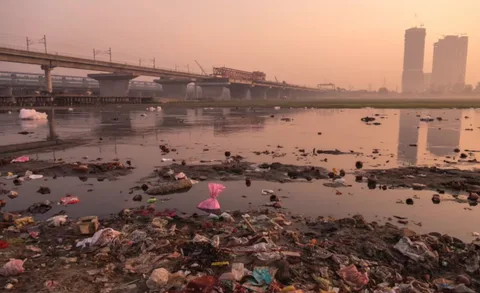A bold proposal to nationalise water companies that repeatedly pollute British rivers and seas has been blocked by the Government, reigniting national debate about public ownership, environmental accountability, and the cost of inaction. The bill, championed by Labour MP Clive Lewis, was designed to implement a “three strikes and you’re out” policy for water companies that consistently fail to uphold environmental standards. But the Government rejected the proposal, citing prohibitive costs and logistical challenges.
This expert breakdown explores the key components of the bill, the arguments for and against it, and what this means for the future of the UK’s water industry.
What Was in Clive Lewis’s Water Bill?
A Radical Proposal for Environmental Accountability
Clive Lewis, MP for Norwich South, introduced a private member’s bill designed to tackle one of the most contentious environmental issues in the UK: sewage pollution by privatised water companies. His bill proposed a clear punitive framework:
- First strike: A major sewage spill counts as a violation.
- Second strike: The company would be officially warned—“in the last chance saloon.”
- Third strike: The company’s license would be terminated and the firm would be brought into public ownership—without any compensation to private shareholders.
The policy, in Lewis’s words, aimed to dismantle the “price-gouging, asset-stripping, river-killing” practices of “vulture-capitalist” operators and restore public accountability.
Provision for Affordable and Free Water
In addition to the nationalisation clause, the bill required the Government to ensure water remained affordable for all. It even included the option of providing free water “where appropriate” to ensure no household went without this essential service due to cost.
Why the Bill Was Blocked
Government’s Main Objection: Cost
Environment Minister Emma Hardy led the Government’s opposition to the bill, stating that renationalising the water industry would come with a staggering price tag: more than £200 billion. She argued that the financial implications alone made the bill unfeasible, not to mention the potential legal challenges and complications of terminating licenses without compensation.
Hardy also assured the House of Commons that the Government remained committed to improving water quality but preferred reform within the current privatised structure over sweeping nationalisation.
Lack of Cross-Party Support
Despite a passionate four-hour debate in the House of Commons, Lewis failed to secure broader parliamentary support. He eventually adjourned the bill to be reconsidered on July 4, acknowledging that without Government backing, its passage was highly unlikely.
Clive Lewis’s Arguments: “Three Strikes and You’re Out”
Holding Polluters Accountable
In his impassioned speech, Lewis attacked the ongoing degradation of the UK’s rivers and coastlines, laying the blame squarely on the shoulders of privatised water companies. He accused them of focusing on shareholder payouts rather than infrastructure improvement, noting:
“Under the Bill, if a water company breaches the terms of its licence with a major sewage discharge, it can forget shareholder payouts and piling on more debt.”
“Three strikes and you’re out. Licence terminated, on your bike.”
He also condemned the legacy of Margaret Thatcher’s privatisation policies, arguing that the structural shift to private ownership had placed profits over public health and environmental sustainability.
Infrastructure “Sweated for Private Gain”
Lewis further argued that the infrastructure built and maintained with public funds was now being exploited for private profit. He insisted that essential assets like water pipes and treatment plants should be returned to public control:
“Those water infrastructures they’ve been sweating for private gain, back into the public realm, thank you very much.”
The Current State of the UK Water Industry
Pollution Crisis in British Waterways
The UK’s privatised water companies are facing mounting criticism and public outrage for their role in polluting rivers and coastlines. Repeated sewage discharges—especially during heavy rainfall—have raised alarms about the long-term health of aquatic ecosystems and public safety.
Several companies, including Thames Water, have admitted to releasing untreated sewage into rivers hundreds of times per year, blaming outdated infrastructure and underinvestment.
Skyrocketing Consumer Bills
At the same time, consumer bills have continued to rise. Water companies are passing costs on to households as they scramble to raise funds for emergency infrastructure upgrades. Critics argue that customers are being forced to subsidise decades of underinvestment, all while shareholders continue to receive dividends.
Case Study: Thames Water on the Brink
The £3 Billion Rescue Loan
Less than two weeks before the debate on Lewis’s bill, Thames Water secured a critical £3 billion rescue loan—a lifeline that will keep the company afloat for another year. However, the firm is still weighed down by at least £16 billion in debt.
Lewis commented on the bailout, saying:
“That half a billion in interest payments will keep a rotten system afloat for just a little longer.”
This situation has come to symbolise the broader failure of the privatised water system: heavily indebted companies using emergency loans to continue operations while pollution incidents mount.
Government’s Plan: Reform, Not Nationalisation
Why the Government Says Public Ownership Isn’t the Answer
The Government’s official stance is that while water companies must be held accountable, full-scale nationalisation is too expensive and inefficient. Ministers argue that the UK needs urgent improvements to infrastructure and enforcement rather than a complete overhaul of ownership structures.
Instead, the Government is pursuing:
- Stricter regulations and fines for polluting companies.
- New investment frameworks to incentivise infrastructure upgrades.
- Ofwat (the water regulator) intervention powers in extreme cases.
However, critics say these measures are reactive and insufficient, lacking the long-term vision necessary to prevent future crises.
Beyond Privatisation vs Nationalisation: A Citizens’ Assembly?
Lewis’s Proposal for a New Kind of Public Debate
An overlooked but innovative component of Lewis’s bill was the proposal to establish a citizens’ assembly to deliberate on the future of the UK’s water industry. This would allow everyday people—not just politicians or lobbyists—to weigh in on complex issues such as:
- Who should own and operate water services?
- What role should profit play in managing essential utilities?
- How can environmental protection be embedded in industry structure?
The goal: to move beyond the binary of privatisation versus nationalisation and toward a participatory model of public ownership.
Public Sentiment and the Ongoing Campaign
Growing Demand for Public Ownership
Polling data and grassroots campaigns indicate that public trust in private water companies is declining. Environmental groups, local communities, and several MPs have rallied behind the idea of bringing water utilities back into public hands.
Their arguments include:
- Environmental stewardship: Public ownership allows long-term planning and stricter environmental standards.
- Affordability: Without the pressure to generate profit, water could be made more affordable for low-income households.
- Democratic control: Citizens would have a say in how a vital resource is managed.
Continued Pressure in Parliament
While Lewis’s bill has been adjourned, it hasn’t disappeared. Its core ideas may return in future legislation—especially if the political makeup of Parliament shifts after the next general election.
Campaigners are also working to hold water companies and the Government accountable through:
- Legal action
- Freedom of Information requests
- Direct action and media campaigns
The Road Ahead: Reform or Revolution?
What Will Happen on July 4?
Lewis has delayed the bill’s progress to July 4, allowing more time to build public and parliamentary support. While hopes for passage remain slim without a change in Government, the delay keeps water industry reform on the legislative agenda.
Long-Term Implications
Regardless of whether Lewis’s bill passes, it reflects a growing awareness that the current system is not working. Reforms—whether radical or incremental—are inevitable. The real question is how deep those reforms will go and who will ultimately benefit: shareholders or the public.
Conclusion: Will the Tide Turn?
The battle over the UK’s water industry is far from over. Clive Lewis’s Water Bill may have been blocked, but it has crystallised a growing consensus that urgent change is needed. Whether through nationalisation, stronger regulation, or public-led innovation, the fight to reclaim Britain’s polluted rivers and broken infrastructure continues.
In the end, this debate is not just about ownership—it’s about vision. Do we see water as a commodity, or as a shared resource that must be protected for future generations?
- Evan Name Meaning - June 5, 2025
- Virginia’s Most Popular THC Infused Drinks - June 5, 2025
- Nebraska’s THC Infused Seltzer Recommendations - June 4, 2025






